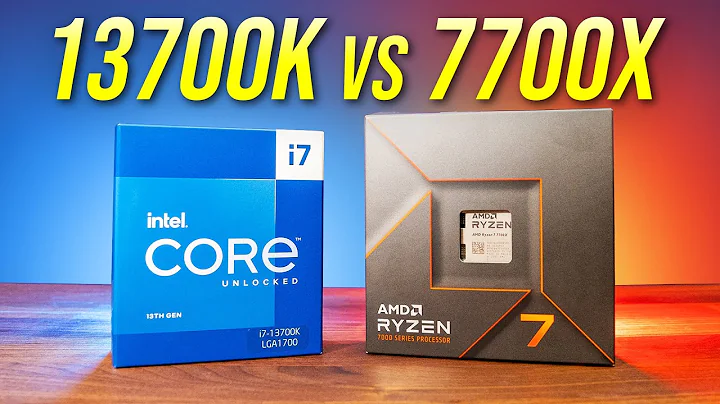
intel-core-i7-113700k vs 7700x-amd-ryzen-which-cpu-is-best
The Ryzen 7 7700X is an 8-core, 16-thread CPU, while the Core i7-13700K also has 8 performance cores with 16 threads.The 13700K has an additional 8 efficient cores without hyperthreading, making it a 16-core, 24-thread CPU.Intel has more L2 cache, but less L3 cache compared to AMD.Intel-core-i7-113700k vs 7700x Both CPUs have the same 5.4GHz single-core turbo boost clock speed.The 7700X costs $399 USD, while the 13700K costs $450. The 13700KF version is available for $20 less if integrated graphics are not needed.
And remember, for all your tech news, TechyMeg has your back. Don’t miss out on the action – head over to their website now and stay in the know!
“The main reason for comparing these CPUs is the $30 to $50 price difference.”
System Setup and Testing Conditions
Both CPUs were tested on the same system with identical memory kits and timings.Windows 11 22H2 was used with core isolation off, Nvidia drivers with resizable BAR enabled, and no power limits were imposed on the CPUs.
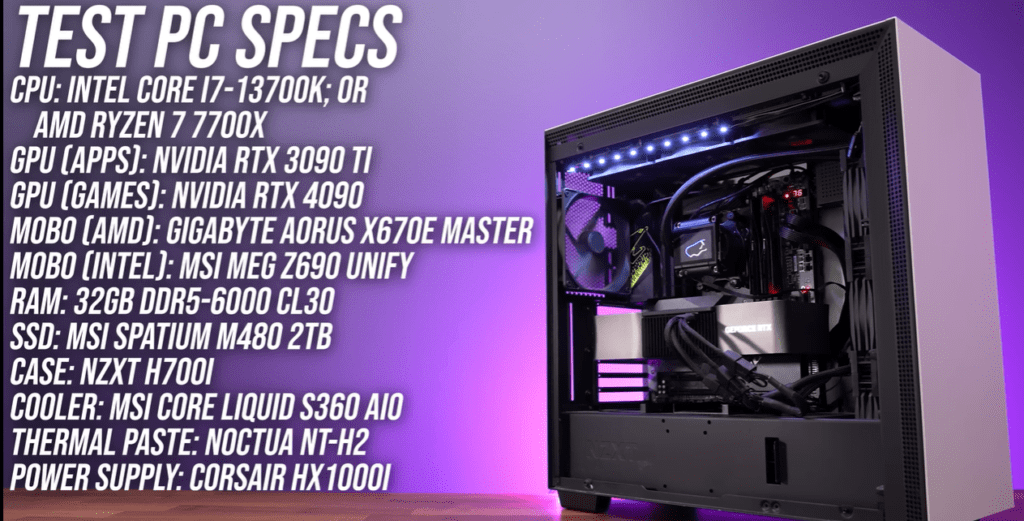
Comparison table of the Ryzen 7 7700X and Core i7-13700K CPUs
| Feature | Ryzen 7 7700X | Core i7-13700K |
|---|---|---|
| Cores (P/E) | 8/16 | 8/16 (16E) |
| L2 Cache (MB) | 3.75 | 5.5 |
| L3 Cache (MB) | 38 | 34 |
| Single-Core Turbo Boost (GHz) | 5.4 | 5.4 |
| Price (USD) | 399 | 450 (430KF) |
| Performance (Productivity) | Slower | Faster |
| Performance (Gaming) | Faster | Slower (except Halo Infinite) |
| Value | Better | Worse |
| Upgrade Path | AM5 (2025) | LGA 1700 (End of line) |
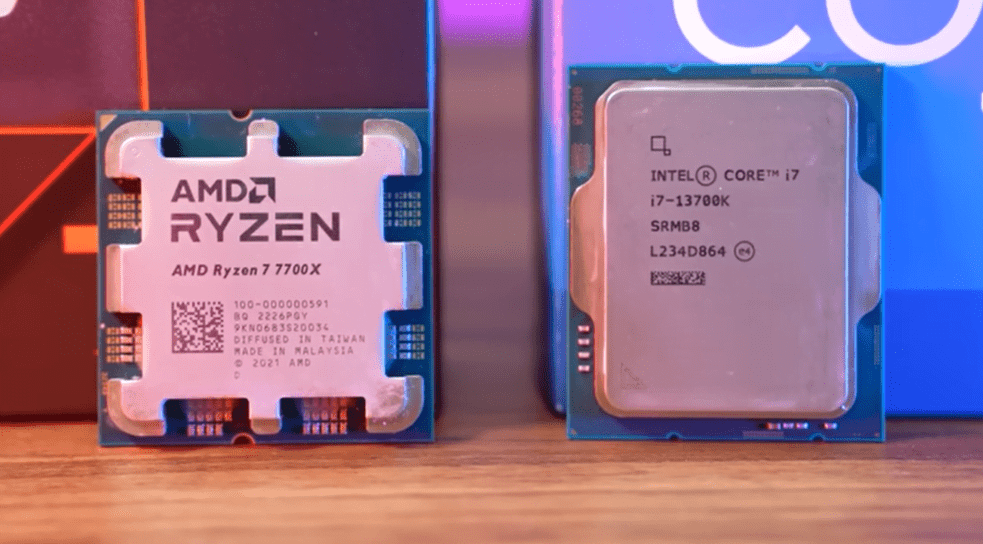
Here is a comparison table of the13700k vs 7700x CPUs. As you can see, the 7700X is a better value CPU than the 13700K, as it is cheaper and performs better in most games. However, the 13700K is a faster CPU in productivity workloads and offers a better upgrade path, as AMD plans to support AM5 through 2025. Ultimately, the best CPU for you will depend on your needs and budget.
If you are a gamer who is looking for the best value for money, the Ryzen 7 7700X is a great option. It is a powerful CPU that can handle even the most demanding games, and it is priced very competitively.
If you are a power user who needs the best possible performance for productivity tasks, the Core i7-13700K is a better choice. It is significantly faster than the 7700X in productivity workloads, and it offers a more future-proof upgrade path.
However, it is important to keep in mind that the 13700K is also more expensive than the 7700X. So, if you are on a tight budget, the 7700X is still a great option.
Ultimately, the best CPU for you will depend on your individual needs and budget. I hope this information helps you make an informed decision.
Productivity Workloads
The 13700K outperformed the 7700X in various productivity workloads.In Blender, the 13700K scored around 45% higher, and in V-Ray and Corona renderer, it showed 38% and 49% higher scores respectively.Linux kernel compilation was completed 33% faster on the 13700K, and LLVM compilation also showed a similar gap between the two CPUs.
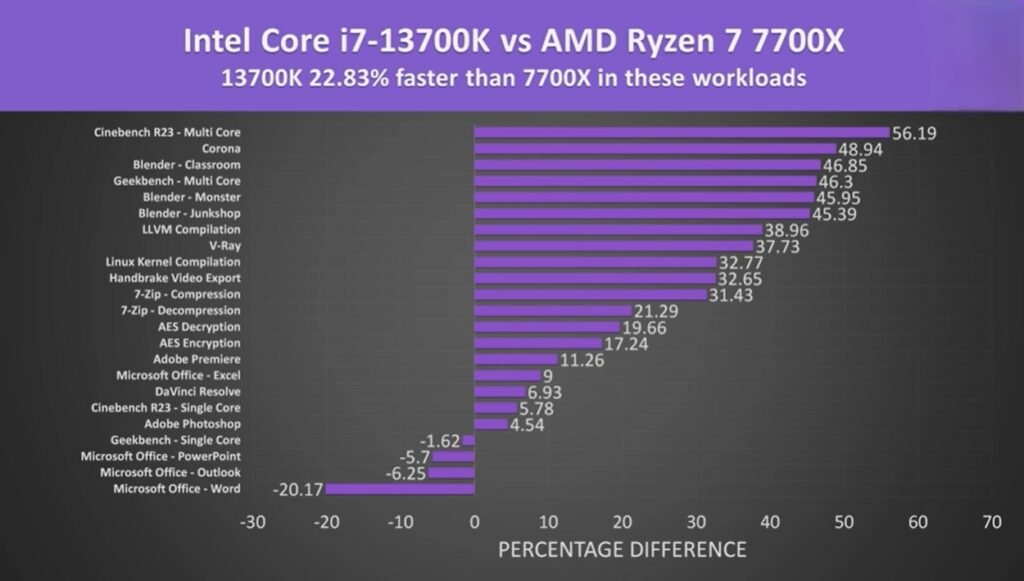
“On average, the 13700K was around 23% faster than the 7700X in these specific workloads. Intel offered better value considering this performance gain.”
Gaming Performance
In 24 games tested at 1080p, 1440p, and 4K resolutions, the CPUs delivered varying performance.Red Dead Redemption 2 showed better performance on AMD, with a 26% higher average frame rate at 1080p.Marvel’s Spider-Man Remastered had an 8% advantage for Intel at 1080p and 1440p, while Metro Exodus Enhanced favored AMD with a 16% higher average frame rate at 1080p.
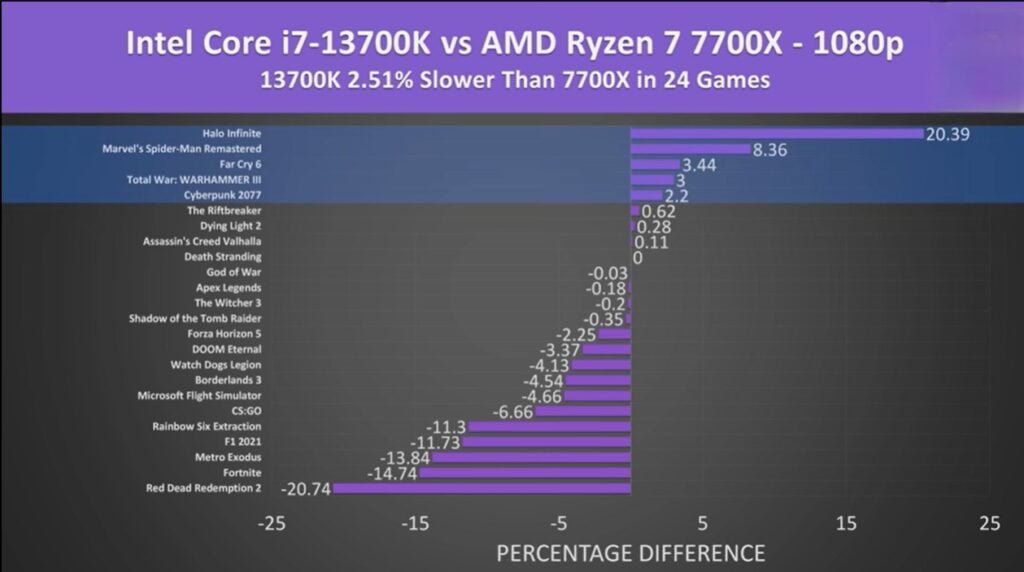
“The difference in gaming performance between the two CPUs was not substantial enough to sway the decision one way or the other.”Differences at 4K Most games are heavily GPU bound at 4K, so CPU selection matters less.The differences between the CPUs at 4K were smaller compared to other resolutions.
The differences at 4K were smaller, as most games are heavily GPU bound there, so CPU selection matters far
Halo Infinite
The 13700K performed better in Halo Infinite, with a 20% boost to average FPS at 1080p and 1440p.This was the biggest difference in favor of Intel out of all 24 games tested at these resolutions.
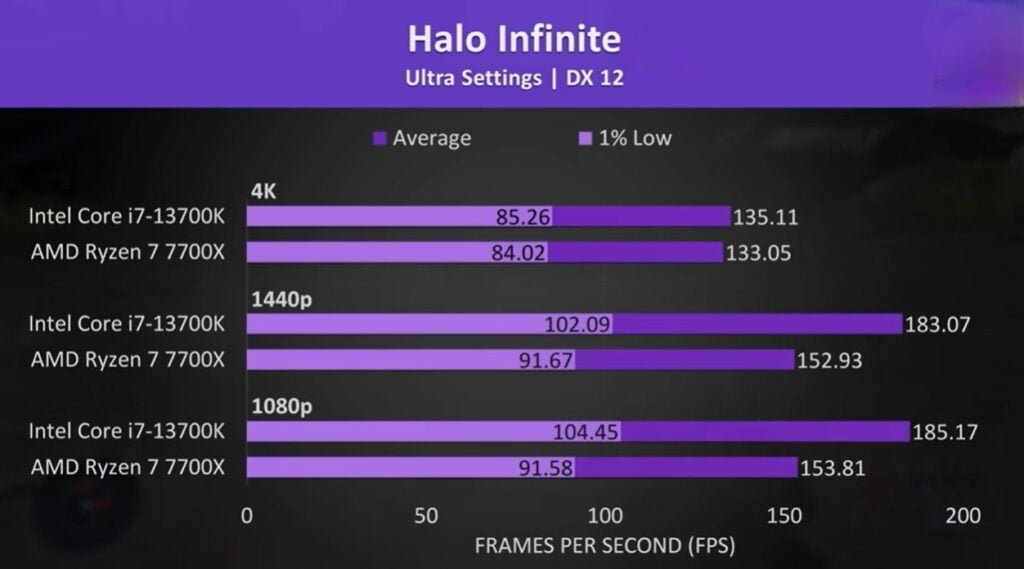
Halo Infinite on the other hand was back to favoring the 13700K, with a 20% boost to average FPS at 1080p and 1440p, the biggest difference in favor of Intel out of all 24 games tested at these resolutions.
Forza Horizon 5
Forza Horizon 5 favored AMD, as the 7700X had higher 1% lows, resulting in a more stable gaming experience.
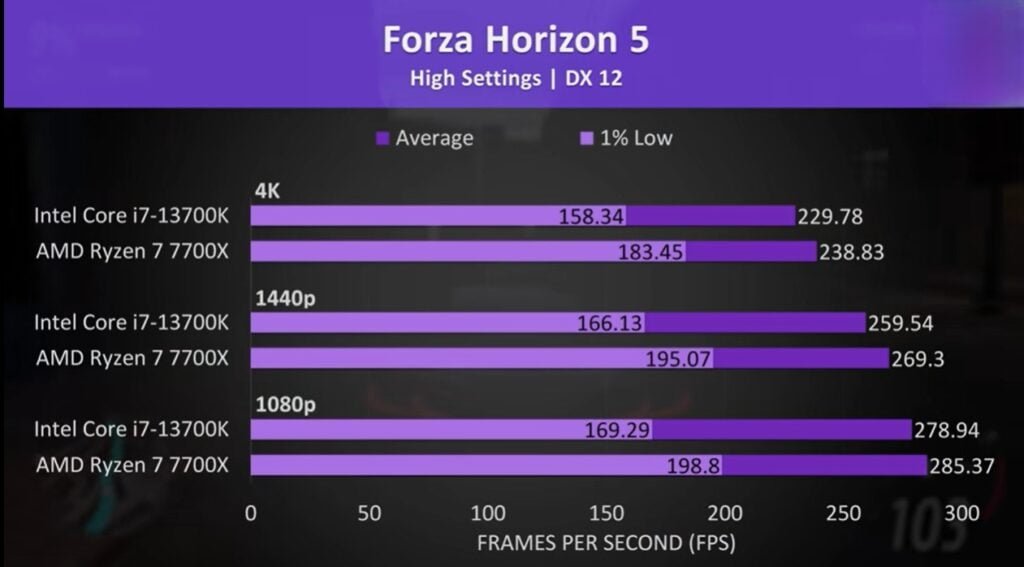
The ball is back in AMD’s court for Forza Horizon 5…a more stable experience with AMD in this game.
Total War: WARHAMMER III
There was barely any difference between the two processors in Total War: WARHAMMER III.Intel had a slight lead at 1080p, while AMD had higher 1% low frame rates at 1440p and 4K with similar average frame rates.

Total War: WARHAMMER III barely had a difference between the two processors…With about the same average frame rates.
CS:GO
CS:GO is sensitive to CPU performance and favored the 7700X regardless of the resolution tested.
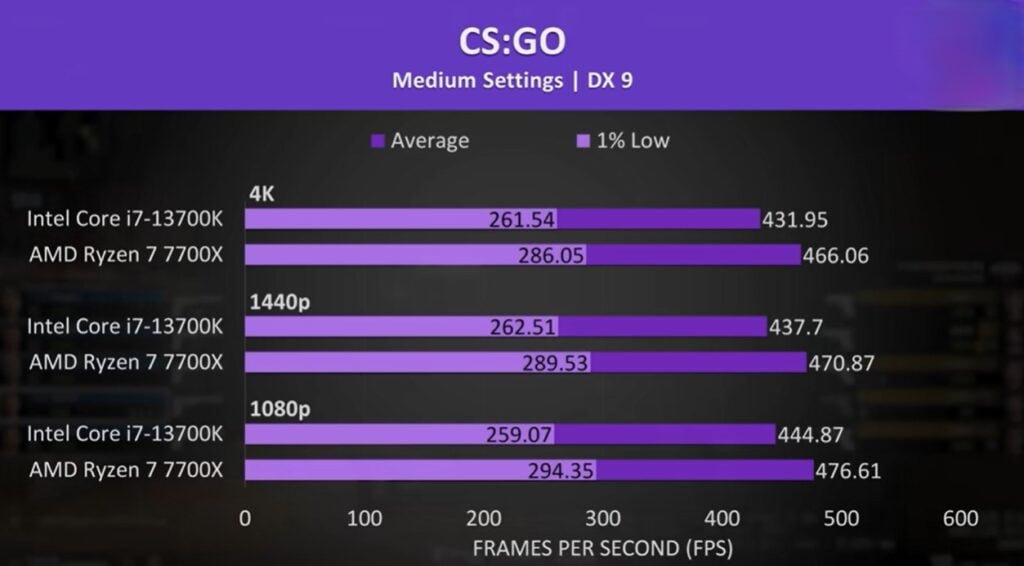
CS:GO is sensitive to CPU performance, and was a game that favored the 7700X regardless of the resolution tested.
Fortnite
The 7700X had an edge in Fortnite, with a 17% higher average frame rate at 1080p and 11% higher at 1440p. There was almost no difference at 4K.
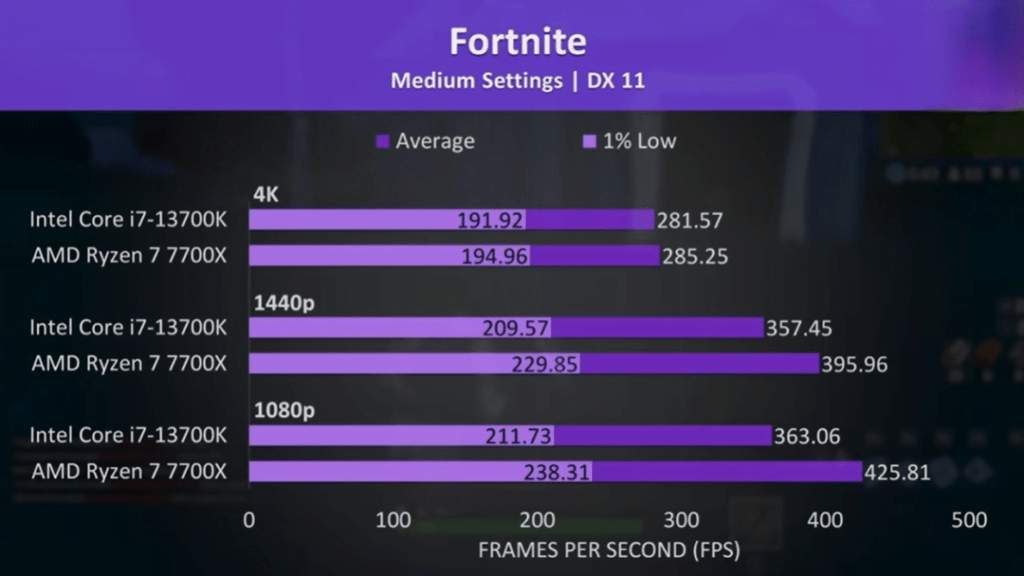
Speaking of eSports games, the 7700X had an edge in Fortnite, reaching a 17% higher average frame rate at 1080p and 11% higher at 1440p, and then there’s almost no difference at 4K.
Far Cry 6
Far Cry 6 had above average gains with Intel, but the difference was not significant.There was a 5 to 6 FPS increase for Intel, which translated to a 3% lead at 1080p and 1440p.
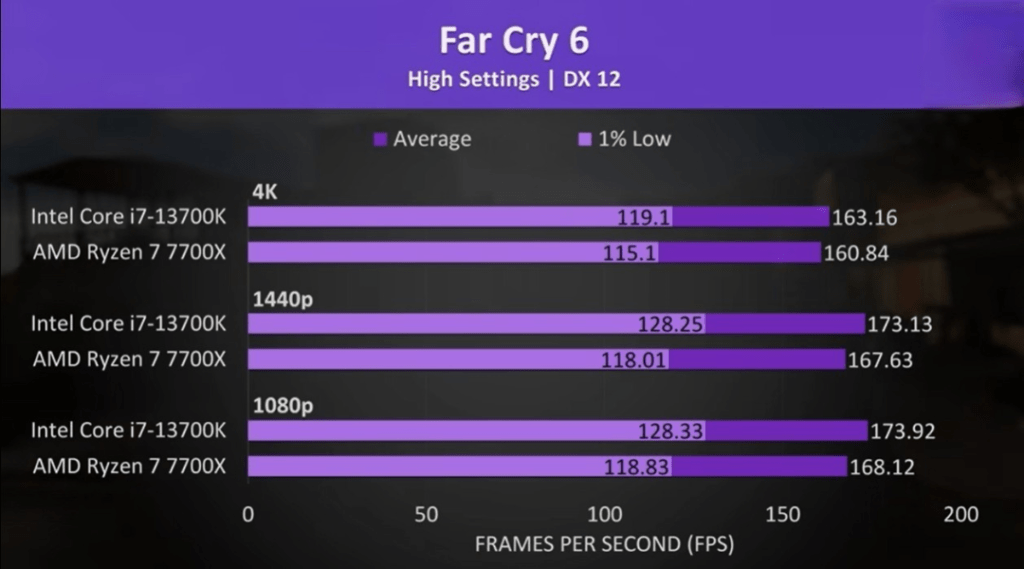
Meanwhile Far Cry 6 had above average gains with Intel, but as we can see here, it’s not exactly a big difference…We’re talking about a 5 to 6 FPS increase best case, which comes out as a 3% lead at 1080p and 1440p.
Overall Performance
In the overall average performance across all 24 games tested, the 13700K was 2.5% slower than the 7700X at 1080p.
Only 5 games showed a more than2% FPS boost with Intel, while 11 games favored AMD with a 2% or greater difference.8 games had less than a 1% difference between the two CPUs.
On average over all 24 games tested, at 1080p Intel’s Core i7-13700K was 2 and a half percent slower compared to AMD’s Ryzen 7 7700X.
Value and Upgradability 13700k vs 7700x
The 7700X offers better value in terms of cost per frame, as it is cheaper than the 13700K and performed better in most games.Even without integrated graphics, the cheaper 13700KF, the 7700X still offers better value.Upgrading in the future may require more expenses with Intel’s 13th gen, as it marks the end of the line for the current socket, while AMD plans to support AM5 through 2025. Intel motherboards may be cheaper currently, but upgrading to Intel’s future generations will require a new motherboard.
With the 7700X both having a lower price and performing better in most of the games, it’s no surprise to see that it’s offering better value in terms of cost per frame…Of course, this is only factoring in CPU price alone and not total platform costs like motherboards or DDR4 memory with Intel as I’ve only tested with DDR5 to fairly compare performance…
Ultimately, either of these two processors are going to run games very well…If the workloads that you’re running would benefit from extra single or multi-threaded performance, then the i7 could be the way to go…Not to mention Intel motherboards seem to be cheaper at the moment…So although Intel’s platform might be cheaper initially, you will need to pay more if you plan on upgrading in a few years time.
“With the 7700X both having a lower price and performing better in most of the games, it’s no surprise to see that it’s offering better value…”







